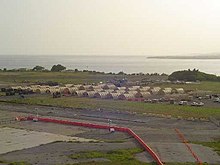Camp Justice (Guantanamo)


Camp Justice is the name given to the portion of the Guantanamo Bay Naval Base where the Guantanamo military commissions are held.[1] It was named by TSgt Neil Felver of the 122 Civil Engineering Squadron in a name the camp contest.[2][3] Initially the complex was to be a permanent facility, costing over $100 million. The United States Congress overruled the Bush Presidency's plans. Now the camp will be a portable, temporary facility, costing approximately $10 million.
On 2 January 2008 Toronto Star reporter Michelle Shephard offered an account of the security precautions reporters go through before they can attend the hearings:[4]
- Reporters were not allowed to bring in more than one pen;
- Female reporters were frisked if they wore underwire bras;
- Reporters were not allowed to bring in their traditional coil-ring notepads;
- The bus bringing reporters to the hearing room is checked for explosives before it leaves;
- 200 metres from the hearing room reporters dismount, pass through metal detectors, and are sniffed by chemical detectors for signs of exposure to explosives;
- Only eight reporters are allowed into the hearing room—the remainder watch over closed circuit TV;
On 1 November 2008 David McFadden of the Associated Press stated the 100 tents erected to hold lawyers, reporters and observers for the military commissions were practically deserted when he and two other reporters covered Ali Hamza al-Bahlul's military commission in late October 2008.[5]
References[edit]
- ^
Army Sergeant. Sarah E. Stannard (4 October 2007). "Prime BEEF stamps hoof prints on Gitmo". JTF-Guantanamo Public Affairs. Archived from the original on 5 February 2012. Retrieved 14 October 2007.
The Red Bulls began construction on what they have since dubbed, "Camp Justice" shortly after their arrival here, and within two weeks, the site had already been classified as operational. Using large tents which had been shipped in by barge earlier this year, the 474th built, from the ground up, their own living quarters, office areas and morale welfare and recreation building.
- ^
William Glaberson (14 October 2007). "Portable Halls of Justice Rise in Guantánamo". The New York Times. Archived from the original on 4 May 2015. Retrieved 14 October 2007.
The complex, including the tent city dubbed Camp Justice, may be the perfect architecture for the long-running limbo that is Guantánamo. Officials from President Bush on down have said they would like to close Guantánamo, yet the administration is just as eager to show progress in trying some of the 330 detainees, most of whom have been held for years without formal charges.
{{cite news}}: CS1 maint: bot: original URL status unknown (link) - ^
Carol J. Williams (14 October 2007). "Tent city built for terror trials". The Baltimore Sun. Retrieved 14 October 2007.
A complex of canvas Quonset huts arrayed like dominoes has risen on an abandoned airfield here, where just a year ago the Pentagon envisioned a $125 million permanent judicial center in which terrorism suspects would be brought to trial.
mirror - ^
Michelle Shephard (2 January 2008). "Guantanamo hearings try patience: Underwire bra, extra pen among items unpopular with military overseers at terrorist suspects' trials". Toronto Star. Archived from the original on 2 April 2012. Retrieved 4 January 2008.
Khadr's next court appearance is expected in February. Construction on a new tent city beside the courthouse will probably be completed by then. Reporters will sleep eight to a tent, along with the lawyers, court observers, soldiers and court staff. The area is called Camp Justice, and a sign out front has a picture of a snarling red bull with smoke coming out of his nostrils.
- ^
David McFadden (1 November 2008). "With US election, sun setting on Guantanamo trials". Associated Press. Archived from the original on 1 November 2008. Retrieved 1 November 2008.
Camp Justice, erected six months ago for the first U.S. war-crimes trials in a half-century, already feels like a ghost town. A hundred canvas tents pitched on a weed-choked airfield to house an army of lawyers and journalists stand mostly empty, even as air conditioning blasts through them to keep iguanas and large rodents at bay.
